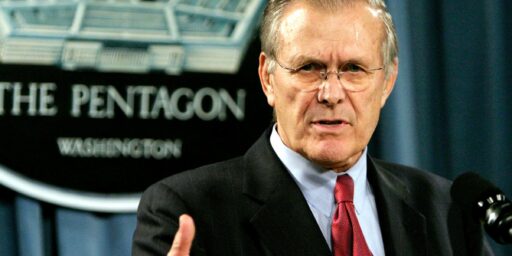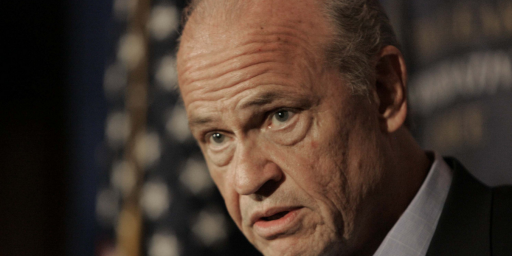Rumsfeld’s Legacy: Netcentricity
One conservative crititic of Defense Secretary Donald Rumsfeld says he will leave at least one important positive legacy: the transformation of the department into a net-centric environment.
Analyst: Advanced Networks To Be Rumsfeld Legacy (Defense Today, p. 1, $)
Defense Secretary Donald Rumsfeld may depart his post soon, but his push to infuse the military with netcentricity should be remembered as a positive legacy, a well-known defense analyst said. Many in Washington want Rumsfeld to step down, including much of the White House staff, according to Loren Thompson, of the Lexington Institute, a Washington-area think tank. […] “With his second quadrennial defense review wrapping up, Rumsfeld is undoubtedly asking himself why he needs to put up with all us fools for three more years anyway, so a near-term departure seems probable,” Thompson wrote in a brief.
But Rumsfeld should be applauded for his interest in netcentricity, Thompson said, noting that netcentricity will figure prominently in the final report on the Quadreennial Defense Review (QDR) that the secretary is to receive in draft form on Dec. 23. An every-four-years exercise, the QDR is a top-to-bottom evaluation of U.S. military needs and capabilities. “The report reiterates core themes of Rumsfeld’s transformation framework, stressing in particular the virtues of `netcentricity,'” Thompson said.
“Netcentricity is the economical way of describing network-centric warfare, an innovation that Rumsfeld appropriated from the Navy early in his tenure to explain how previously balkanized military forces could be integrated into a unified enterprise using information technologies. The basic idea is to create a resilient network of global links that will enable all elements of the joint force to communicate instantaneously, getting whatever information is needed to warfighters in whatever form they need it. This is a genuinely new approach to warfare, as its late progenitor, [Adm.] Arthur Cebrowski, often pointed out to those who failed to grasp its potential,” he added. “Netcentricity enables extraordinary leaps in military performance, leaps that will eventually save millions of lives and billions of dollars. But netcentricity is still in its infancy, and Rumsfeld has poured so much money into pursuing it that traditional tools of warfare like submarines and bombers have been neglected. Rumsfeld’s successor will have to figure out which initiatives are worth continuing, and which are redundant or unworkable.”
Rumsfeld’s legacy will be largely wrapped up in the Iraq War, simply because of the scope of that effort and the political controversy that has surrounded it. If it turns out well in the long run, he’ll get credit for it despite mistakes; if it turns out poorly, he’ll be blamed regardless of his positive contributions.
Still, in terms of the big picture role of the SECDEF, Thompson is likely right. It may well be that another SECDEF at this juncture would have pushed the net-centric concept ahead, given that the surrounding technology (Service Oriented Architecture (SOA), most notably) was ripe. But Rumsfeld has been an especial enthusiast of the project and rammed it through despite the natural reticience of the senior service staffs who would have preferred the money be put into major capital projets.
Related:





Despite being a pretty staunch liberal, I almost voted Bush in ’00 – and it was because of Rummy’s tranformation plans. He deserves mad props for actually shaking things up and pushing some of it through.
Try, “nutcentricity.” The guy is a total lunatic.